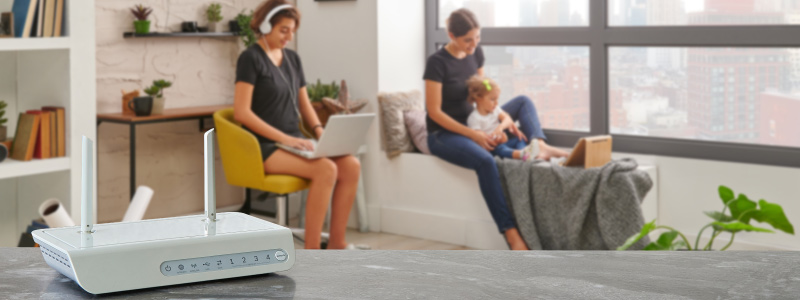5G WiFi vs Fiber: Which one Is right for you?

Matthew Harrington

As we delve into the comparison of 5G Wi-Fi vs Fiber, it's important to understand that these two technologies are revolutionizing our digital world. Both offer unique benefits and challenges in providing high-speed connectivity.
We'll start by understanding the basics of both 5G Wi-Fi and Fiber, including how they work and what sets them apart. Following this, we will explore their individual advantages from faster speeds to reliable connections. The cost factor is also a crucial aspect to consider when choosing between 5G Wi-Fi and Fiber internet services so this will be discussed too. We will also cover customer satisfaction levels with both types of service providers, which can be an insightful deciding factor.
Your location plays a significant role in determining whether you should opt for wireless technology or cable internet. Lastly, armed with all this information about 5G WiFi and Fiber, you'll be able to make a decision that best suits your needs.
Understanding the basics of 5G Wi-Fi and Fiber
High-speed internet access is now available in a variety of forms. Let's dive into the world of 5G Wi-Fi and Fiber Internet.
What is 5G Wi-Fi?
5G is the fifth-generation of wireless tech that offers fast speeds, low latency, and flexibility. It's like the Usain Bolt of internet connections.
Fiber internet: The basics
Fiber optic internet uses fancy light pulses to transmit data at lightning-fast speeds.
The difference between 5G Wi-Fi and Fiber internet
- Speed: Fiber is consistent like a metronome, while 5G can be a bit temperamental depending on your proximity to a tower.
- Coverage: Fiber requires cables, which means it's not available everywhere. 5G, on the other hand, relies on magical towers and can reach even the most remote corners.
- Reliability: Fiber is tough as nails, but if the cable gets damaged, it's game over. 5G can be affected by weather, but since there are no cables involved, it's less likely to get tripped up.
Explore the benefits of 5G Wi-Fi
When it comes to high-speed internet, 5G Wi-Fi is a game-changer. This next-gen wireless tech offers numerous advantages that can significantly enhance your online experience.
Faster speeds
5G Wi-Fi offers tremendous speeds, with data transmission up to 100 times faster than 4G networks and certain wired connections. Say goodbye to buffering and hello to seamless connectivity.
Better reliability
Unlike older wireless tech, 5G Wi-Fi is more reliable thanks to advanced beamforming techniques. It stays connected even in the face of signal interference or physical obstructions like walls and buildings.
Greater coverage
With the help of small cells strategically placed in various locations, 5G Wi-Fi expands network coverage. This means improved service quality, especially in densely populated areas where bandwidth demand is high.
If you're wondering whether 5G Wi-Fi or Fiber offers faster speeds, both are impressive. Just keep in mind that actual performance may vary depending on factors like network congestion and distance from the nearest cell tower or fiber optic cable.

Why Fiber internet is better than 5G Wi-Fi
Fiber-optic internet, or fiber, is the Usain Bolt of broadband connections. It uses light signals to transmit data through thin strands of glass, giving you lightning-fast speeds and rock-solid reliability.
So, why choose fiber over 5G WiFi? Here are a few reasons:
- Speed that'll make your head spin: While both fiber and 5G WiFi are fast, fiber can reach gigabit speeds - up to 1000 Mbps or even more. That means you can stream HD videos, game online, and download large files without breaking a sweat.
- Reliability that won't let you down: Unlike 5G WiFi, fiber isn't bothered by pesky things like weather or physical obstacles. It's like having a dependable companion who never disappoints.
- Upload and download at the same speed: With fiber, you get symmetrical speeds. That means uploading large files or video calling your loved ones won't be a drag. It's all about balance, baby.
- Low latency for the win: Fiber has lower latency than 5G WiFi, which means less waiting around. Perfect for online gaming or video conferencing when every millisecond counts.
But wait, there's more. Fiber networks are built to keep up with the rapidly expanding needs of our digital lives. From streaming movies to controlling our smart homes, fiber has got your back.
If your household is a bustling hub of devices and bandwidth-hungry activities, fiber is the superhero you need. Say goodbye to buffering and hello to the fast lane of the internet. Explore plans now.
How does the cost of 5G WiFi compare to Fiber?
When it comes to internet costs, 5G WiFi and Fiber can be as unpredictable as the weather. Prices vary depending on location, plan, and provider.
The cost of 5G Wi-Fi
5G Wi-Fi plans can be pricier than traditional broadband. Blame it on the need for speed and fancy technology. But hey, competition might bring those prices down.
Fiber internet pricing
Fiber internet plans offer lightning-fast speeds and reliability. It's like having a cheetah as your internet provider. Worth the investment, if you ask us.
A comparative analysis
Don't stress about comparing prices yourself. Use HomeLinkd's tool to find the best deal in your area. It's like having a personal internet shopping assistant.
Is 5G Wi-Fi more reliable than fiber?
Both technologies have their strengths. Fiber is like a reliable friend who's always there for you, rain or shine. But it's not available everywhere yet. 5G WiFi is like a gamble; it may work out, but you can't be certain.
Satisfaction levels of customers using 5G Wi-Fi and Fiber internet services
When choosing between 5G Wi-Fi and Fiber Internet, customer satisfaction is crucial. Both 5G Wi-Fi and Fiber Internet offer their own benefits, yet the aim is to obtain a dependable, high-speed connection that caters to one's requirements.
A recent survey by the American Customer Satisfaction Index (ACSI) found that fiber optic providers generally score higher in customer satisfaction compared to traditional broadband providers. This is due to factors like speed consistency, reliability, and value for money.
Fiber-optic's high scores
The ACSI report highlighted that users appreciate the superior speeds offered by fiber optics. Low latency makes it great for heavy-duty tasks like gaming or streaming HD videos without buffering. It performs well during peak usage times when many people are online.
Emerging popularity of 5G Wi-Fi
5G Wi-Fi is gaining traction quickly due to its potential for higher speeds and broader coverage. Early adopters have reported positive experiences. However, comprehensive data on overall user satisfaction isn't readily available yet as it's still being rolled out in various regions.
Taking user reviews into account
In addition to reports and surveys from reputable sources like ACSI, consider individual reviews from actual users on platforms like Homelinkd's provider comparison page. Bear in mind that different people have varying needs when it comes to web access, so what may be satisfactory for one person might not necessarily meet the criteria of another.
Consider your location
When it comes to choosing between 5G Wi-Fi and Fiber internet, location is key. Not all areas have both options, so knowing what's available near you is crucial.
Our coverage map provides detailed information on internet availability in different regions. Check it out to see if 5G Wi-Fi or Fiber is an option for you.
The availability of 5G Wi-Fi
5G technology is fast and reliable, but it's not everywhere yet. In densely populated areas, 5G is more accessible due to the increased demand for its speed and reliability. Rural areas may still be waiting for 5G due to infrastructure challenges.
Fiber internet coverage
Fiber optic networks have been around longer and offer high-speed connections. They're great for heavy internet users like gamers or remote workers. Despite their advantages, fiber optic networks may not be accessible in certain locations due to geographical limitations.
Evaluating your needs based on location
Your specific needs matter too. For those living an active urban lifestyle who require consistent connectivity, 5G WiFi could be the right fit. But if you need stable high-speed internet at home for video conferencing or streaming, Fiber is the way to go.
Make an informed decision
Faced with a plethora of choices for high-speed internet, you must make an informed decision. Two prominent contenders are 5G Wi-Fi and Fiber. Making the right choice depends on several factors such as your location, usage needs, budget constraints, and personal preferences.
If you're situated in a city where 5G networks have been deployed extensively, selecting 5G Wi-Fi could be an option. It offers faster speeds and improved reliability over traditional wireless connections. Nevertheless, one must bear in mind that while 5G is notably quicker and has lower latency than before, its coverage may be spotty as it relies on small cells.
Fiber internet, on the other hand, provides consistent high-speed connectivity irrespective of your distance from the service provider's central office or weather conditions. But installing fiber cables can be expensive if they aren't already laid down in your area.
To make an informed decision between these two services:
- Evaluate what type of user you are: If you're a heavy gamer or streamer who requires ultra-fast speeds with low latency, Fiber might suit better than 5G Wi-Fi which may experience signal interference issues.
- Analyze your budget: While both offer competitive pricing models depending upon various plans available; installation costs for Fiber could tip scales towards choosing 5G Wi-Fi especially if infrastructure isn't readily available at your location.
- Consider future-proofing: With technology evolving rapidly; investing into something like Fiber that has virtually unlimited potential capacity might prove beneficial in the long run against ever-increasing data demands.
The key here is to gather all relevant information about each service before making a final call. Remember that what may be advantageous for one individual could not necessarily be the most suitable choice for another, due to everyone's distinctive circumstances.
Key thought:
When choosing between 5G Wi-Fi and Fiber for high-speed internet, consider factors such as location, usage needs, budget constraints, and future-proofing. While 5G offers faster speeds in urban areas but with inconsistent coverage, fiber provides consistent connectivity regardless of distance or weather conditions. Assess your user type and budget to make an informed decision that suits your unique situation.

Conclusion
Now that you have uncovered the major differences between 5G Wi-Fi vs Fiber, hopefully you can make an informed decision regarding which suits your needs better.
Both offer unique benefits and challenges in providing high-speed connectivity.
Start your search by browsing through HomeLinkd's many deals.
There's something for everyone.










